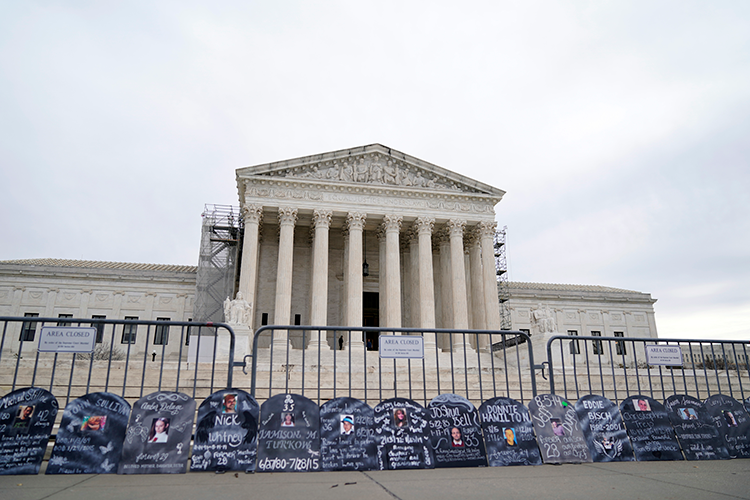Supreme Court blocks controversial Purdue Pharma opioid settlement

Gravestone signs with the names of people who died from using OxyContin lined a security fence outside the Supreme Court ahead of oral arguments in December. (AP Photo/Stephanie Scarbrough)
The Supreme Court on Thursday blocked a controversial proposed Purdue Pharma bankruptcy plan that would have provided billions of dollars to help address the nation’s opioid crisis in exchange for protecting the family that owns the company from future lawsuits.
The closely watched fight involving the bankrupt maker of OxyContin is part of a national reckoning over the role of drugmakers and other companies in the public health opioid addiction crisis.
Purdue declared bankruptcy in 2019, as it faced thousands of lawsuits and allegations that the company helped fuel the crisis by the marketing of its blockbuster painkiller OxyContin. Members of the Sackler family did not themselves file for bankruptcy.
The Office of the U.S. Trustee, a branch of the Justice Department, challenged the bankruptcy deal, saying it violated federal law. The legal issue before the Supreme Court in Harrington v. Purdue Pharma was whether, according to federal bankruptcy laws, the Sacklers can be shielded from future opioid-related litigation by those who do not consent to give up their rights to sue.
This Week in Supreme Court News
• ‘Storm clouds loom ahead’ after Supreme Court dismisses abortion dispute, Justice Jackson says• Supreme Court blocks controversial Purdue Pharma opioid settlement
• SCOTUS blocks EPA’s ‘downwind’ air-quality initiative
• SEC defendants are entitled to jury trials, SCOTUS rules in case with ‘broad ramifications’
• Supreme Court would allow emergency abortions in Idaho, Bloomberg reports
• 5th Circuit ‘glossed over complexities,’ Supreme Court says in refusing to curb US social media contacts
• Ban on gender-affirming care for transgender minors will be reviewed by Supreme Court
• Gun laws aren’t ‘trapped in amber,’ SCOTUS says while upholding restraining-order gun ban
A panel of the U.S. Court of Appeals for the 2nd Circuit in New York said yes, citing two provisions of the bankruptcy code. One says a bankruptcy court “may issue any order, process, or judgment that is necessary or appropriate to carry out the provisions of” the law. The other says a plan may “include any other appropriate provision not inconsistent with the applicable provisions of” the code.
The appeals court interpreted that to mean a bankruptcy court could approve provisions not expressly forbidden by the code. In August, the Supreme Court put the bankruptcy deal on hold to consider the 2nd Circuit’s ruling.
The high-stakes legal fight has split relatives of overdose victims and those whose lives were shattered by opioid addiction. Some insisted the bankruptcy deal was allowing the Sackler family to get off easy, while others said immunity was the only way to get desperately needed settlement money to communities and victims themselves.
Sackler family members have long denied responsibility or personal responsibility.
Since 2000, more than 300,000 people have died in the United States of prescription opioid overdoses, according to statistics from the Centers for Disease Control and Prevention. The crisis recently has evolved into an even deadlier phase, marked by the use of synthetic opioids such as fentanyl, which have fueled an overdose death toll of more than 100,000 each year.
States, local governments, Native American tribes, hospitals and victims have sued opioid manufacturers, drug distribution companies, retail pharmacy chains and others. The complex litigation has resulted in more than $50 billion in settlements with states aimed at helping them ease the crisis.
As part of its bankruptcy reorganization, Purdue agreed to settle the lawsuits it faced, in a deal valued by the company at up to $10 billion. The plan negotiated for victims and their families shields the Sackler family from future lawsuits in exchange for the family contributing up to $6 billion and giving up control of the company.
In 2021, a U.S. District Court judge overturned the deal initially approved in bankruptcy court, ruling that the family members who are not part of the bankruptcy proceedings cannot be exempted from future claims. The 2nd Circuit reversed and approved the bankruptcy plan, saying that shielding the Sacklers from lawsuits was needed to “ensure the fair distribution” of the settlement money.
The Justice Department asked the Supreme Court to intervene. Solicitor General Elizabeth B. Prelogar told the court that under bankruptcy law, the rights of alleged victims to sue cannot be taken away without their consent.
Purdue said the Justice Department’s position would allow a single person to veto the plan despite overwhelming support from victims, states and local governments.
The Justice Department separately resolved a civil and criminal probe into Purdue, which pleaded guilty in 2020 to three felonies; the company will pay $225 million to the government if the bankruptcy settlement goes through. The Sackler family also agreed to pay $225 million in civil damages to the Justice Department.



